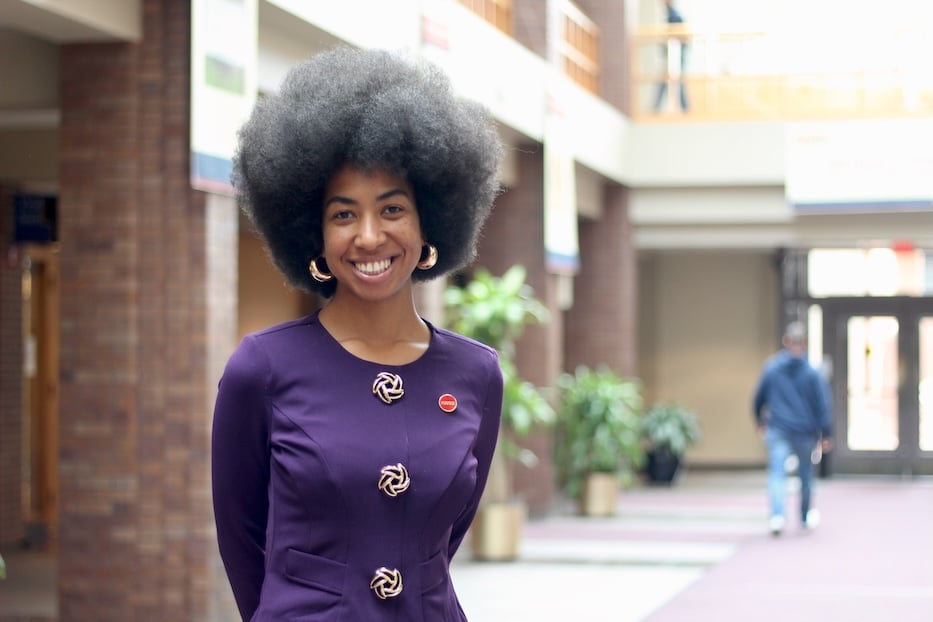
Culture & Community | Politics | Arts & Culture | Community Heroes | Elicker Administration
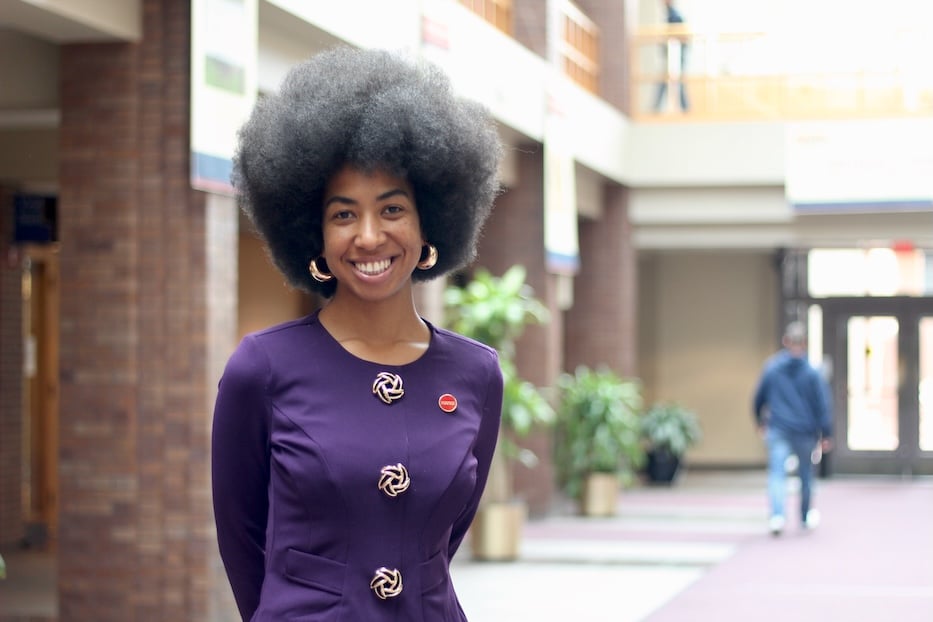
Sha McAllister. “New Haven is good soil,” she said. “It shows the richness of its talent, creativity, and art in its people.” Lucy Gellman Photos.
A creative connector, knitter of neighborhoods, and rising arts superstar has been tapped to lead the city’s Department of Arts, Culture & Tourism. As she takes on the role, her first priority is to listen—and to fill in the gaps where New Haven’s artists and arts organizations may need it the most. Her only obstacle may be executing a big vision on a shoestring budget.
That connector is Shamain “Sha” McAllister, a rooted member of the city’s arts ecosystem who has already become known as a coalition builder, savvy stretcher-of-funds, and trusted confidant through her work at the International Festival of Arts & Ideas, Kulturally LIT, Best Video Film & Cultural Center (BVFCC), Cultured AF, Nasty Women Connecticut, the New Haven Symphony Orchestra and a host of other city arts organizations.
She’s also no stranger to City Hall, having served as a co-creator on New Haven’s Cultural Equity Plan and a community navigator for Vision 2034. Tuesday morning, city officials and arts leaders alike gathered in the building’s first-floor atrium to announce and celebrate her tenure, which began Monday.
Prior to her time at the city, McAllister was the Associate Director of Education & Community Impact for the International Festival of Arts & Ideas. She takes over from Adriane Vegas Jefferson, who in February left New Haven to lead Atlanta’s Office of Cultural Affairs.
Since February, Deputy Cultural Affairs Director Kim Futrell has kept the department running, including the distribution of funds for the Neighborhood Cultural Vitality (NCV) grant program. This year, the program awarded $91,642 in support to 30 grantees.

Shari Caldwell, Diane Brown, Fred Christmas and Sha McAllister at a Dixwell Neighborhood Festival earlier this year. Lucy Gellman File Photo.
“It is now time to take arts and culture to the next level,” said McAllister, who has called New Haven home since 2014, and currently lives in the city’s Beaver Hills neighborhood. “New Haven has it all. There’s no need to venture out of town to see a thought-provoking show, drive far to have a delicious meal, or hear your favorite musician … everything we need is right here.”
“New Haven is good soil,” she added. “It shows the richness of its talent, creativity, and art in its people.”
She inherits a big job with a little budget. During her five-year tenure, Jefferson helped the city grow its cultural footprint in over a dozen new ways, from supporting longstanding events like the Puerto Rican Festival and Elm City Freddy Fixer Parade to helping launch a Cultural Equity Plan, envision the city’s inaugural Black Wall Street Festival, and harness public-private partnerships that filled in some of the budgetary gaps she was trying to navigate.
But for that outsized economic and artistic footprint—which has helped put New Haven on a national cultural map and brought millions of tourism dollars into the city—city funding hasn’t kept up. Currently, the department receives just $190,000 in the city’s $703.7 million general fund budget (an additional $178,185 goes to department salaries). Its not-for-profit arm, New Haven Festivals, Inc., allows the department to apply for outside grants beyond that allocation.
And yet, McAllister seems unfazed by the task ahead of her, in part because she’s navigated what it means to work for a cash-strapped arts organization for years, and always come out with more collaborations. Long before the neighborhood festivals and vibrant community partnerships for which she may be best known, McAllister was building parts of New Haven’s creative sector from the ground up, jumping in where she saw a need that was going unfilled or a creative who was in need of an extra set of hands.

Juanita Sunday and Sha McAllister at Fair Haven Day earlier this year. Lucy Gellman Photos.
During her time at Albertus Magnus College, which first brought her to the city in 2014, she founded the school’s Student Justice League, a space for peers to gather and discuss everything from police brutality to human trafficking and global affairs. After graduating, she made the choice to stay in the city, building a film series around Black experience while getting her feet wet in the nonprofit world.
While she had studied business management and criminal justice at Albertus—and for a short time worked at People’s United Bank—she found a home at the New Haven Symphony Orchestra, where she served as a development coordinator through 2021. Every time she thought about leaving New Haven, her faith stopped her. Something greater than her compelled her to stay.
“God said, ‘What are you running from that you can’t create?’” she remembered in an interview earlier that year.
She heeded that advice many times over. While still at the NHSO, McAllister joined the tiny and powerful team of visionaries behind Kulturally LIT (then Elm City LIT Fest), helping get a Black book festival (and before long, an outdoor film series) off the ground in the midst of a global pandemic. Not even a year later, she joined over a dozen artists and arts workers to dream up New Haven’s first-ever cultural equity plan, a roadmap for the city’s arts landscape that became public in early 2022.
She joined the International Festival of Arts & Ideas, re-envisioning its neighborhood festivals, high school fellows program, and community partnerships, including a commitment to honor a “community cultivator” in memory of the late Sharon Clemons that continues beyond the Festival today. When asked, she would usually give some version of the same answer: she was serving the community in the ways that she knew how.
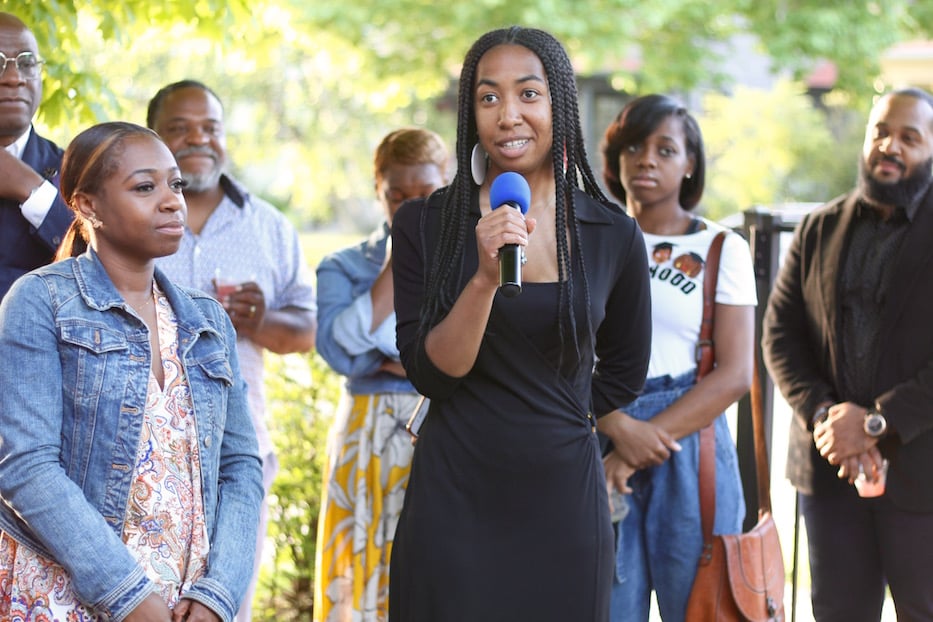
McAllister at the launch of the Sharon Clemons Community Cultivator Award at BLOOM in 2022. Lucy Gellman File Photo.
Under her leadership at the Festival, grassroots programming flourished, from new neighborhood-specific awards (presenting one to Ms. Ann Boyd before she passed remains something McAllister is deeply proud of) to One City One Read, for which she worked closely with the New Haven Free Public Library (NHFPL). Even this year, when funding from the National Endowment for the Arts was cut off, McAllister rolled with it, reimagining the contours of the program to keep a discussion series and film festival afloat.
Outside of that work, she has stepped into facilitation and board leadership many times over, including at Best Video Film & Cultural Center (BVFCC) and the Arts Council of Greater New Haven (in the interest of full disclosure, the Arts Paper is a program of, but editorially independent from, the Arts Council). When the New York Times named New Haven one of its top 52 places to visit in 2023, she helped lead a discussion at the Shubert Theatre around how artists could capitalize on the moment, from storytelling initiatives to making sure people knew the city’s doors were open.
Informally, she’s also kept close tabs on many of her collaborators, meaning that it’s not uncommon to see her pop up—say, at the UrbanScapes Native Plant Nursery or J&J Restaurant on Grand Avenue—on a given afternoon well after the neighborhood festivals have passed.
“She is the one in the room to say, ‘Okay, but you’re doing great,’” said Arts Council Executive Director Hope Chávez , who has worked closely with McAllister through the organization’s board. “Have you slept? Are you drinking your water? Do you know that the Lord loves you? Do you know you’re good?’ She comes with that heartedness, and we owe it to her to do it for her too.”
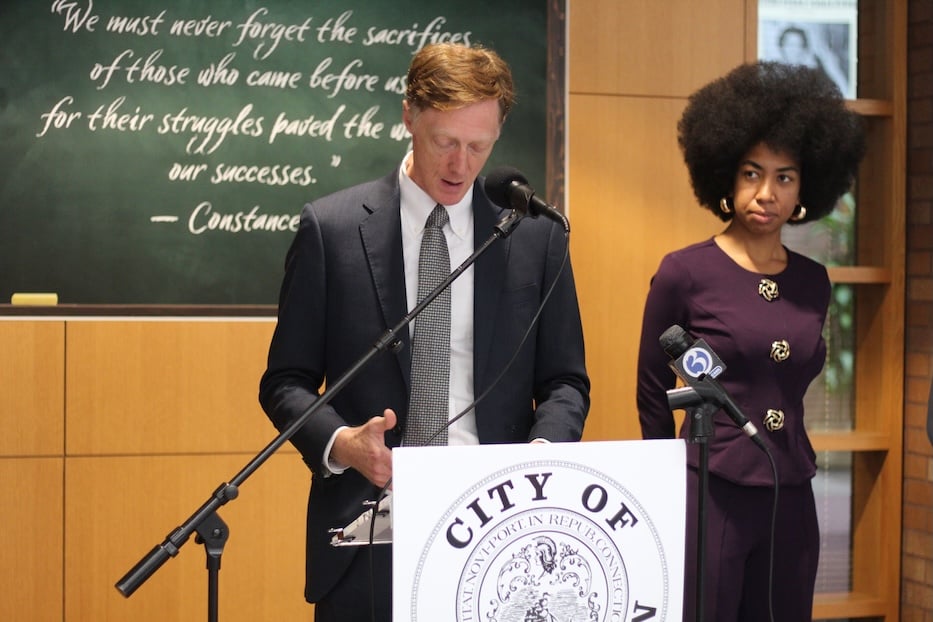
Mayor Justin Elicker at Tuesday's press conference.
As she joins the department this week, her first priority will be to “listen and assess,” she said. “I would like to get artists, arts organizations and arts businesses in town on the same page,” from better communication to a centralized space where they can streamline and coordinate events, rather than compete for attendees, dollars, and general support.
She also wants to champion the rich cultural resources in and also beyond downtown New Haven, including in neighborhoods that don’t traditionally get the love they might deserve. In Fair Haven, for instance, people don’t know that they can get a whole meal at J&J, attend a free event at the branch library, and then head a few blocks over to see a show at Collective Consciousness Theatre.
Or they can head to West Rock, where Honda Smith has built a creative community of her own as she nurtures young people at The Shack. Or they might spend a day in the Hill, walking the same streets that Fred Harris and Ann Boyd once walked to champion education in their communities.
“New Haven is more than just pizza,” she said, with praise for local arts hotspots like BLOOM, House of Naan (“don’t get me started on the okra crunch!”), Possible Futures and the many small food businesses that line corridors like Grand, Kimberly and Congress Avenue, where it’s possible to get a beef patty at one shop, and mango with chamoy and tajín two doors down. “If there’s a show going on,” she suggests stopping by the Shubert, Collective Consciousness, or Toad's Place, which has emerged as a personal favorite during her time in the city.
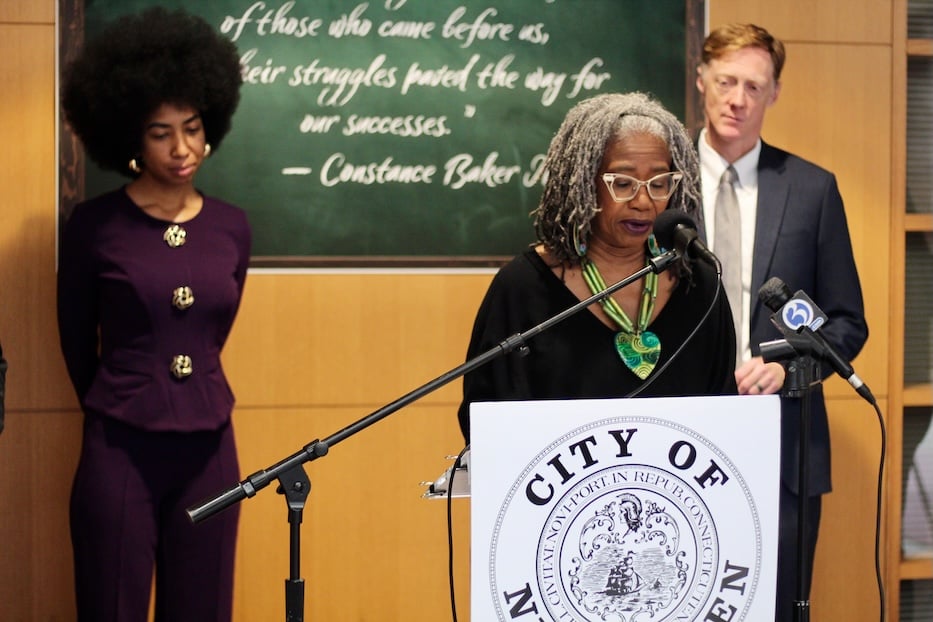
IfeMichelle Gardin: "Her ability to analyze, mobilize and inspire is remarkable, but even more remarkable is her heart."
Tuesday, speakers championed the appointment as good for both the department and for the city much more broadly, particularly as its artists and arts organizations navigate a precipitous drop in federal funding and cultural landscape in which resources seem continually stretched. While part of the job is imagining new community partnerships, McAllister already has several in her back pocket, including with artists and activists in every corner of the city, and what seems like every discipline too.
“It doesn’t happen by accident that New Haven is this cultural hub,” Mayor Justin Elicker said. “It takes a lot of work by our team … and I also think it takes work from a values perspective of us consistently saying that we are a welcoming and open city that embraces everyone. No matter who you are, you are welcome in our city if you want to be a welcome member of our city.”
In a testament to the network McAllister has built, Tuesday’s crowd included not only city officials, but also representatives of the Shubert, Arts & Ideas, Sweets & Sounds Entertainment, Kulturally LIT, Albertus Magnus, the Arts Council and NXTHVN—just a few of the organizations that she has worked with during her 11 years in the Elm City.
Looking to the late bell hooks and the author Toni Morrison, Kulturally LIT Founder and Cultural Affairs Commissioner IfeMichelle Gardin spoke of McAllister as a gifted and generous weaver of community, who understands how to work with, between, and across different groups of people, and lives with her heart wide open. She is unapologetic in who she is and what she stands for—including her work as a Black woman where arts institutions are still tied to a heavy and long history of white supremacy.
“She has made her life about something greater, about us,” Gardin said, referencing Morrison’s 1993 Nobel Prize lecture. “About this city. About this community. About the power of art to heal, unite, and transform. Her ability to analyze, mobilize and inspire is remarkable, but even more remarkable is her heart. Her unwavering commitment to uplift others, to create pathways for artists, youth, and visionaries, shows us all what’s possible when we lead with love and purpose.”

